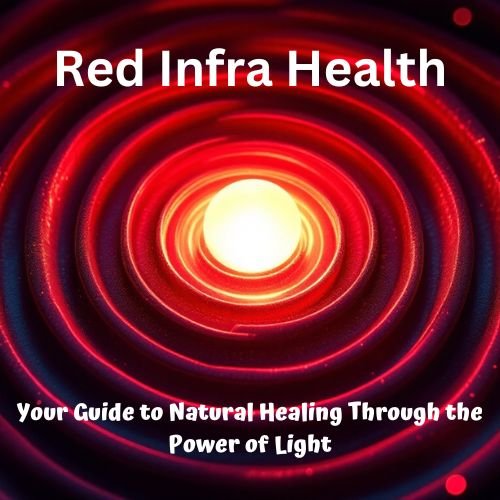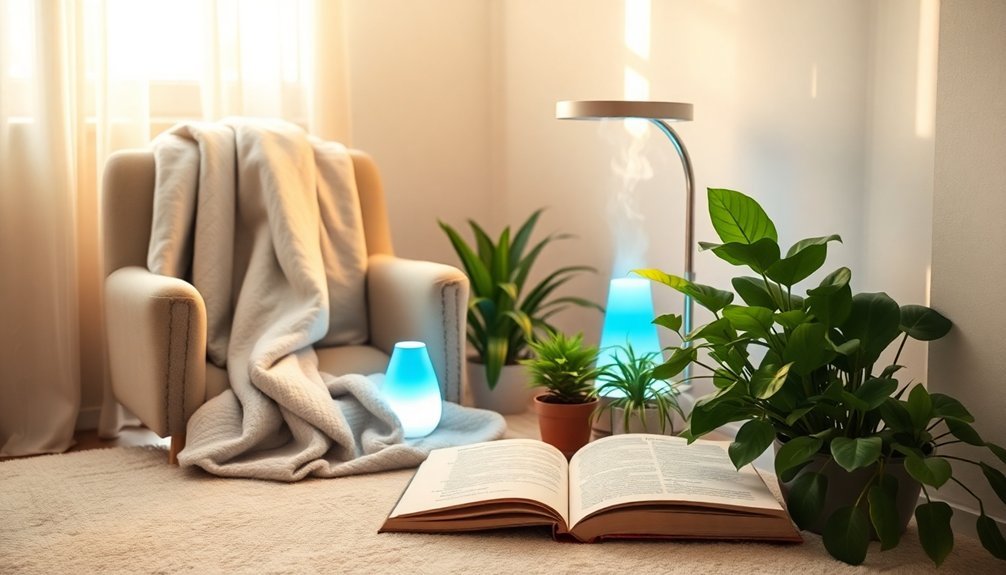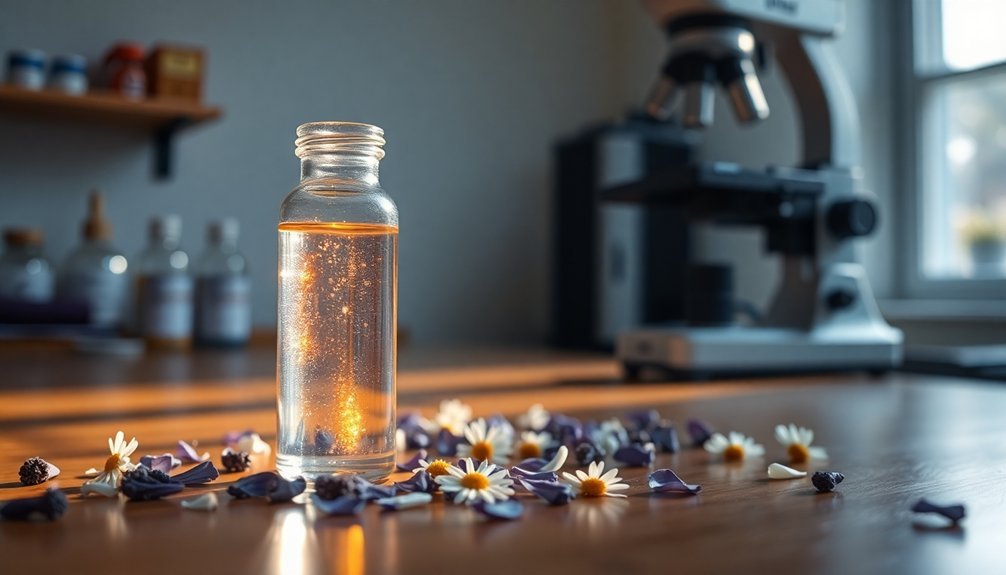You can support your eye health naturally at home through simple DIY treatments and lifestyle changes. Start with nutrition-rich recipes like salmon with collard greens or spinach omelets that provide essential omega-3s and antioxidants. Apply gentle remedies like cooled green tea bags to reduce eye strain, or create a soothing compress using aloe vera and coconut oil. Practice the 20-20-20 rule when using screens, and protect your eyes from UV damage with quality sunglasses. Regular eye exercises and herbal supplements like eyebright or bilberry can strengthen your vision. Discover more natural solutions to enhance your eye health and prevent common vision problems.
Natural Vision Support Recipes

Don't forget to incorporate protein-rich alternatives like an ahi tuna and steamed broccoli plate, which offers similar benefits to salmon while adding variety to your menu.
For a vegetarian option, you can whip up a black bean and rice burrito that's rich in vitamin A and fiber, supporting both your eye muscles and overall vision health.
Remember to pair these meals with plenty of water to maintain proper eye hydration. The broccoli and tuna combination provides essential lutein and zeaxanthin that help protect against age-related macular degeneration and cataracts.
Eye Health Herbal Remedies
For centuries, herbal remedies have offered natural solutions for supporting eye health and addressing common eye concerns. Today, you'll find a variety of herbs that can help maintain your vision and soothe eye discomfort. From eyebright for strain relief to ginkgo biloba for improved retinal circulation, these natural options provide gentle yet effective support. Saffron has shown promise in delaying vision degeneration among elderly individuals.
You can incorporate these beneficial herbs into your eye care routine through various methods:
- Create soothing compresses using green tea bags or cucumber slices to reduce inflammation and provide cooling relief.
- Prepare herbal eyewashes with calendula or chickweed to cleanse and calm irritated eyes.
- Take supplements containing bilberry, turmeric, or fennel to support overall eye health from within.
Traditional remedies like wolfberries and chrysanthemum flowers have stood the test of time, offering benefits for conditions ranging from dry eyes to blurred vision.
When combined with essential nutrients like astaxanthin, omega-3 fatty acids, and lutein, these herbal solutions can form an extensive approach to eye care.
Remember to complement these natural treatments with proper eye protection and regular check-ups for thorough vision health.
Nutrition for Eye Protection

You'll find powerful protection for your eyes in specific nutrients and foods that work together to prevent vision problems and maintain eye health.
Your daily diet should include dark leafy greens, colorful fruits, nuts, fish, and lean proteins to get essential vitamins A, C, and E, plus minerals like zinc and selenium, along with vital omega-3 fatty acids.
Studies show that consuming foods rich in lutein and zeaxanthin helps filter out harmful blue light and protects the retina's health.
Essential Eye-Health Foods
Maintaining healthy vision starts with what's on your plate. Your eyes need specific nutrients to function effectively, and you'll find them abundantly in certain foods. From leafy greens packed with lutein and zeaxanthin to omega-3-rich fish, your daily diet choices can markedly impact your eye health. Beta-carotene absorption is enhanced when carrots are consumed with fats.
1. Pack your meals with colorful vegetables and fruits. Kale, spinach, and collard greens protect your retina, while carrots provide essential vitamin A.
Don't forget to include oranges and blueberries, which offer vitamin C and antioxidants to prevent cataracts and maintain overall eye health.
2. Add omega-3 fatty acids to your diet through fish like salmon, sardines, and tuna. If you're vegetarian, you can get these essential nutrients from flaxseed.
These foods help prevent dry eyes and protect against age-related macular degeneration (AMD).
3. Incorporate zinc-rich foods into your meals. Options include oysters, beef, and pumpkin seeds. Zinc plays a vital role in preventing AMD and maintaining healthy vision.
You can also get zinc from chickpeas and poultry's dark meat, making it easy to meet your daily requirements through various dietary choices.
Protective Nutrients Guide
Three essential nutrient groups work together to safeguard your vision: vitamins, minerals, and antioxidants. Your eyes particularly need vitamins A, C, E, and D, which protect against free radicals and support various aspects of eye function.
Vitamin A, working with zinc, helps produce melanin and maintains low-light vision, while vitamin C reduces your risk of cataracts and macular degeneration.
On the mineral front, you'll need zinc (8-11mg daily) and copper (2mg daily) to protect your eyes from sun damage and oxidative stress.
Don't forget omega-3 fatty acids, which you can get from fish, nuts, and seeds to support proper retinal function.
For antioxidant protection, focus on lutein and zeaxanthin – they're your eyes' natural blue light filters. You'll find these in leafy greens like kale and spinach, and you should aim for 10mg of lutein and 2mg of zeaxanthin daily.
Beta-carotene rounds out your antioxidant defense by helping prevent age-related vision decline. To maximize these nutrients' benefits, eat a varied diet rich in colorful fruits and vegetables, and don't skip your regular eye exams.
Home Eye Care Essentials
Taking care of your eyes at home doesn't require expensive products, as you can use natural remedies like chilled cucumber slices, cold compresses, and aloe vera to soothe and protect them.
You'll want to follow basic protective measures daily, including wearing UV-blocking sunglasses outdoors and maintaining good eye hygiene by washing your hands regularly.
Keeping synthetic tears and eye drops handy can help you quickly address common issues like dryness and irritation while incorporating protective eyewear during activities that might pose risks to your eyes.
Natural Eye Care Products
A well-stocked natural eye care kit forms the foundation of effective home eye care. You'll want to include both herbal remedies and homemade products that can provide relief from common eye discomfort.
Natural solutions like Cineraria Maritima and Euphrasia support eye circulation and address dryness, while Causticum and Sepia help with vision clarity issues.
Creating your own eye care products at home is both cost-effective and eco-friendly. You can make soothing eyewashes using chamomile, calendula, and eyebright, or prepare DIY eye drops with distilled water and organic rosewater. For immediate relief, cold compresses and green tea bags work wonders for reducing puffiness and eye strain.
Here are three essential natural eye care products you can make at home:
- Herbal eyewash: Combine cooled chamomile tea with a pinch of sea salt for a gentle cleansing solution.
- Moisturizing eye compress: Mix aloe vera gel with coconut oil and apply using cotton pads.
- Antioxidant eye treatment: Create a paste using crushed bilberry and green tea leaves for under-eye application.
Remember to store your homemade products in sterile containers and replace them regularly to maintain freshness and effectiveness.
Daily Eye Protection Tips
Safeguarding your eyes requires consistent daily habits that protect against strain, damage, and deterioration. To minimize digital eye strain, keep your screens at least 20 inches away and implement the 20-20-20 rule: every 20 minutes, look at something 20 feet away for 20 seconds.
Don't forget to adjust your screen's brightness to match your surroundings and use built-in glare-reduction features.
Protect your eyes from harmful UV rays by wearing sunglasses that block 100% of UVA and UVB radiation whenever you're outside. If you're participating in sports or hazardous activities, don't skip wearing appropriate safety goggles.
For contact lens wearers, always wash your hands before handling lenses and follow proper cleaning protocols.
Your diet plays a vital role in eye health. Include plenty of leafy greens, citrus fruits, and foods rich in omega-3 fatty acids. Stay hydrated by drinking eight glasses of water daily, and make certain you're getting adequate amounts of vitamins A, C, E, lutein, and zinc through your meals.
Make eye hygiene a priority by cleaning your eyelashes and lids daily, and practice eye-relaxation techniques like palming when you're experiencing strain.
Preventive Eye Therapy Methods

Everyone's eyes deserve protection through a thorough approach to preventive care. You'll find that combining natural remedies with proper dietary choices and protective measures creates an exhaustive shield for your vision health.
By incorporating warm compresses and gentle eye massages into your routine, you can improve tear quality and reduce dryness naturally.
Your diet plays a vital role in maintaining healthy eyes. Make sure you're getting enough vitamins A, C, and E, along with essential minerals like zinc. Don't forget to include omega-3 fatty acids from sources like oily fish and flaxseed oil, and stay well-hydrated throughout the day.
Here are three proven preventive methods you can start using today:
- Apply preservative-free eye drops and saline rinses to cleanse and lubricate your eyes regularly
- Take regular breaks from screen time using the 20-20-20 rule: every 20 minutes, look at something 20 feet away for 20 seconds
- Use herbal remedies like chamomile or calendula for their soothing properties, and consider adding bilberry supplements to your daily routine
Remember to maintain proper eye hygiene and schedule regular eye examinations to catch potential issues early.
Relaxation Techniques for Eyes
Modern living demands countless hours of screen time, making eye relaxation techniques essential for maintaining visual comfort and preventing strain.
Practice palming, where you cover your eyes with your palms while breathing deeply for 1-2 minutes, creating a soothing darkness that helps your eyes recover.
Practice eye movement exercises by looking in four directions – up, down, left, and right – holding each position for 2-3 seconds. You can also trace a figure-eight pattern with your eyes for enhanced flexibility.
For focusing exercises, try alternating between near and distant objects over three minutes, or perform pencil pushups by focusing on a pencil tip at varying distances.
Don't forget to incorporate gentle massage techniques. Apply light pressure around your eye sockets using circular motions, and work along your eyebrows and under-eye area.
For maximum benefit, warm your hands by rubbing them together before placing your palms over closed eyes. Remember to take 10-minute breaks every 50 minutes of screen time, and make certain you're getting adequate sleep to support natural eye recovery.
Vision Supporting Lifestyle Practices

Beyond eye exercises and relaxation, your daily habits can profoundly impact your vision health. You'll find that combining proper nutrition, physical activity, and protective measures creates a solid foundation for maintaining healthy eyes.
Start by incorporating dark leafy greens, omega-3 rich fish, and vitamin A-packed orange fruits into your diet, as these nutrients directly support your eye function and protect against common vision problems.
1. Make exercise a priority
Regular walking and physical activity help control conditions that affect eye health, including high blood pressure and diabetes. You'll get the added benefit of stress reduction, which also supports eye wellness.
2. Protect your eyes consistently
Wear UV-blocking sunglasses when outdoors, use protective goggles during sports or home projects, and consider adding UV-blocking films to your windows at home.
3. Don't skip regular eye care
Schedule exhaustive eye exams, practice proper hygiene with contact lenses, and follow the 20-20-20 rule when using digital devices (take a 20-second break every 20 minutes to look at something 20 feet away).
Remember to maintain a healthy weight and stay informed about your family's vision history to better manage your eye health.
Natural Eye Healing Applications
Three powerful natural remedies can help soothe and heal common eye problems at home. Start with warm compresses, which you'll apply for 10 minutes to stimulate tear production and release blocked oil glands. After using the compress, gently massage your eyelids to distribute the oils evenly across your eye surface.
You can harness the power of herbs through cooled chamomile tea bags placed over your eyes to reduce inflammation. However, it is crucial to note that chamomile tea can induce allergic conjunctivitis in some individuals.
For enhanced healing, consider using calendula or eyebright as eye washes, while bilberry supplements can improve your night vision and reduce eye fatigue. Ginkgo biloba's circulation-boosting properties make it especially valuable for preventing conditions like glaucoma.
Don't overlook the healing potential of kitchen ingredients. Create a simple saline rinse to cleanse your eyes, or apply cold cucumber slices to reduce puffiness. You'll find relief from eye soreness with Epsom salt compresses, while turmeric's anti-inflammatory properties can ease irritation.
For best results, pair these treatments with a diet rich in omega-3s from sources like salmon and flaxseed oil, along with vitamins A, C, and E to support overall eye health.
Frequently Asked Questions
Can Eye Exercises Permanently Improve Vision Without Glasses or Contact Lenses?
You can't permanently improve vision through eye exercises alone. While they may help with eye strain and focusing, there's limited scientific evidence that exercises can replace the need for corrective eyewear like glasses.
How Long Should I Wait Between Applying Different Natural Eye Treatments?
You don't need strict waiting times between natural eye treatments. Just see how your eyes respond to one treatment before starting another. You can combine treatments like warm compresses and eye drops safely.
Are Natural Eye Treatments Safe During Pregnancy?
Most natural eye treatments are safe during pregnancy, but you'll want to check with your healthcare provider first. Focus on gentle options like saline rinses, warm compresses, and omega-3 supplements for the safest approach.
Can Children Use These Natural Eye Remedies Safely?
You'll need adult supervision when using natural eye remedies for children. Always check with your pediatrician first, use sterile equipment, and follow proper dosages to guarantee your child's safety with these treatments.
Will Natural Treatments Interfere With Prescribed Eye Medications?
Yes, natural treatments can interfere with your prescribed eye medications. You'll need to check with your doctor, as some herbs and supplements may alter drug effectiveness or cause harmful interactions.
In Summary
You've learned several natural ways to care for and protect your eyes at home. From herbal remedies to nutritional support, these DIY treatments can complement your regular eye care routine. Remember to practice eye relaxation techniques daily and maintain vision-friendly lifestyle habits. While these natural solutions can help, don't skip professional eye exams – they're essential for monitoring your overall eye health.





Leave a Reply